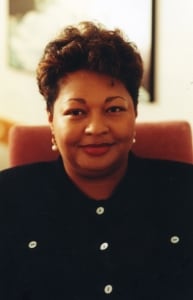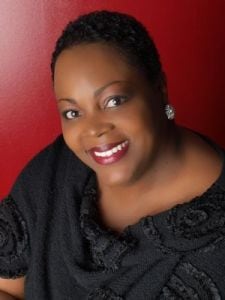Plenty of black women are living bold, self-defined, purpose-filled lives. Many of us are making our mark in community, family, professional and entrepreneurial endeavors. We’re thriving — even though our stories are sometimes obscured by splashier headlines about our poor health, our questionable marital prospects, our economic status and perceptions on our level of anger.
In this series, Fierce celebrates with an array of noteworthy black women who are putting their best faces forward. They’re showing what it takes to get on and stay on the right track.
In this final installment of the series, journalist Katti Gray shares the stories of two women who reclaimed their health after a crisis and found new value in life in the process. The series opener focused on “Keys to Our Success.” Part 2 was “Single and Satisfied for the Holidays.”

“Healing is a very proactive thing,” Bridgette A. Lacy says. “You just have to push yourself every day to get better.”
After 12 months of suffering with headaches that her primary care physician presumed were triggered by a run-of-the-mill sinus irritation, Bridgette A. Lacy began to see what appeared to be a ring of smoke through one eye.
Disturbed by the change in her vision, she called her optometrist. “This was September 1999, during Hurricane Floyd. It was pouring down rain,” says the North Carolinian, a writer, who, at the time, was 37. “The eye doctor says to me, ‘You need to get to an emergency room right away.’”
Lacy had a floater — a spot caused by small protein deposits in the back of the eye. Floaters are a relatively common annoyance, but in some cases, they can signal serious illness. To be thorough, the ER team swiftly put Lacy through a battery of tests that failed to yield answers. Finally, they administered a brain scan. That’s when they discovered the tumor.
“The emergency room doctor says, ‘You have a brain tumor.’ I start screaming and hollering. … I call my mother. I was hysterical. That’s like something right out of a movie,” Lacy says. “The tumor was benign, which means it’s not cancerous, but a benign brain tumor can still leave you very, very damaged.”
Within days of her diagnosis, a neurosurgeon began a 5 ½–hour operation during which he would delicately shear the tennis ball–sized tumor from the frontal lobe of Lacy’s brain.
When she awoke from the anesthesia, Lacy realized that her life had changed. She no longer could smell anything, and she was blind in her right eye. The loss of peripheral vision made walking, cooking and other basic chores challenging. But rather than fixate on what she lost, she began the tough work of confronting the depression her serious illness wrought and the process of getting back on her feet.
The Path to Recovery
Conjuring an optimum quality of life — in body, mind and spirit — in the aftermath of illness requires a determination to move forward, say women who’ve rebounded from serious sicknesses.
For her part, Lacy ratcheted up what she says was her longtime penchant for “refusing to be the victim.” She sharpened her skills at being her own fiercest advocate and defender. She rallied her family and friends to create a caregiving network. She set goals for her recovery — how she’d rebuild her stamina and eventually cook her own meals again.
She became more plainspoken than ever about her circumstances and her needs, including to the executive editor of the Raleigh, N.C., newspaper where she’d been a part-time staffer.
“He called and said, ‘I put a shoutout for you at church today. Is there anything I can do?’ I said, ‘Yes, could you pay my health insurance while I’m sick?’ And, because I am this kind of person, I added, ‘Can you put it in writing?’”
He granted both requests.
Lacy’s colleagues kicked in with what continues as that newsroom’s long-held tradition of organizing daily meal deliveries for the sick among them. They also helped pay her mortgage. One friend arrived every Thursday evening to share supper with Lacy and to provide encouragement that can pull a convalescing person back from the brink of straight-out blues.
“First of all,” Lacy says, “you’ve got to let people know you need help. I was very specific about the help I needed. … If someone came over, I’d say, ‘Can you take me walking?’ … At a point when I had more than enough food to eat, they asked what else I wanted: I asked for laundry supplies, detergent, paper plates. My mother came [from Washington, D.C.] to clean my house really thoroughly. Order is very important when you’re sick.”
So that she wouldn’t over-tax anyone — including the retired husband of a friend who ferried her to radiation treatments when she developed a second, benign brain tumor in 2009 — she also drew on her own resourcefulness. That year, among other things, she tapped into a publicly funded transportation service for trips to and from treatments. Shrinking the second, noncancerous tumor with radiation allowed Lacy to avoid the trauma of a second surgery.
“Before I got sick, I thought of healing as you lying down and the body knitting itself together,” Lacy says. “But healing is a very proactive thing. You just have to push yourself every day to get better.”
Putting Health First
Lacy’s situation was very black and white: Everything in her life had to take a back seat to her surgery and treatment in order to save her life. But for Valerie Purnell, 55, protecting her health meant making the very difficult choice to let go of other, very important parts of her life.
“I was not happy. I was not healthy. The harder I tried, the more numb I got, the more physically and emotionally sick and exhausted I got,” says Purnell, whose pile-on of troubles included depression, anxiety, sleeplessness, lethargy and dangerously high blood pressure.
For Purnell, it was tough to accept that her hard-earned, high-powered gig as a lobbyist in California’s state capital, Sacramento, was destroying her health. Years of high-pressure and work-related stress was threatening her mental health and pushing her blood pressure up to 160/110, beyond safe limits.
Finally accepting that ignoring her health might lead to a heart attack or stroke, Purnell let go of her big job and fancy house in Sacramento and returned to her hometown, Los Angeles.
Getting healthy meant creating a life that would nurture her, rather than sap her strength. For Purnell, that meant studying to become a mindfulness coach at the University of California at Los Angeles in addition to her law degree. She is also resurrecting a women’s retreat project called Selah, a Hebrew word describing a break between music stanzas.
These days, when Purnell reflects on those years of ill health in Sacramento, she dwells on what she gained. “What that period in my life did was give me the ability to just pause. When you are sick in body and mind, pausing becomes a very necessary thing.”
Illness itself will stop a person, Lacy adds. Getting up again, coming through illness, is what matters. Above all, getting sick made her clear about what’s important in her world.
“You really do learn to live, as I like to say, more brilliantly. You realize tomorrow is not promised,” says Lacy, whose 2009 radiation treatments succeeded, even though her second tumor was more serious than the first one. “You say, ‘I’m gonna use my good dishes today.’ Sometimes I wear perfume, even though I cannot smell it myself. I like to hear people say, ‘Oh, you smell good.’
“Really, you learn to live your best life now.”
Katti Gray is a freelance writer in New York.
Get Better With Support; Don’t Go It Alone
▪ Contact Share the Care, an organization that can teach you how to create your own, volunteer caregiving network.
▪ Support is essential to recover from emotional health problems. Contact NAMI to find a group in your area.










